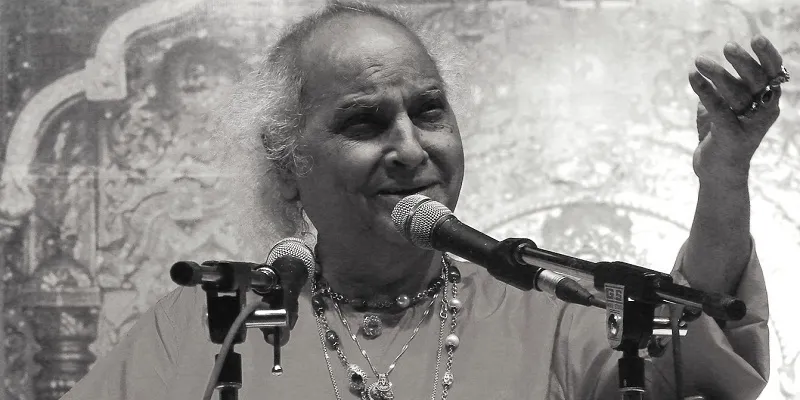Echoing through space, time, and nostalgia, at 85, Pandit Jasraj recalls his life struggles
At 85, Pandit Jasraj’s voice sounds as timeless as it can get, embodying the lasting legacy of Tansen and Baiju Bawra. He believes that each day of an artiste’s life is a struggle – a saadhna. A room in his house is dedicated to the awards and accolades he has received, which includes Padma Vibhushan, Padma Bhushan, Padmashree, Sangeet Natak Akademi award, and Master Dinanath Mangeshkar award. But even as melodic and gamut as his voice, his humility is beyond compare.

Pandit Jasraj belongs to the Mewati Gharana of Hindustani classical music, an offshoot of the Gwalior Gharana. Influenced by Sufi and Kirtankar styles, the vocals practised in the Mewati Gharana uses an excess of sargam and tihais, and has developed a texture of its own. Pandit Jasraj was just four years old, when he was appointed the State musician in the court of Osman Ali Khan, Hyderabad’s last Nizam. Over the past eight decades that he has been practising classical music, he has seen times change. He has come a long way, and is widely considered one of the greatest innovators in classical music today, primarily because of a form of jugalbandi called jasrangi that he created and mastered, styled on the ancient system of moorchhana, a unique collaboration between a male and female vocalist, both singing different ragas at the same time.
No matter where his musical concerts take him to, Pandit Jasraj visits Hyderabad every year during the last week of November to ponder over his life and times. He visits his father Pandit Motiram’s grave and recalls his upbringing and childhood. His father was a classical singer too, who passed away when Jasraj was just four, but his teachings were good enough to last a lifetime. In an exclusive interview with YourStory, near his father’s grave in Amberpet, Hyderabad, the legend recalls his life and struggles, and admits that life for an artiste is a continuous struggle.
Pandit Jasraj thanks his teachers and luck for his accomplishments. At the age of 14, when he was a tabla player, he was deeply distressed by the way accompanying artistes were treated. Jasraj vowed not to cut his hair until he learned to sing. He finally cut it after garnering his first AIR Radio performance, two years later, where he sang Raga Kaunsi Kanada. He received training from Maharaja Jaywant Singh Waghela and Ustad Gulam Kadar Khan of the Mewat Gharana.
Jasraj soon moved to Calcutta (now Kolkata), the City Of Joy bursting with art patrons. Back in those days, the city was booming with legends like Pandit Bhimsen Joshi, Pandit Ravi Shankar, Ustad Allah Rakha, among others, jamming together in concerts that went all night. But young Jasraj’s life was not going to be easy. He recalls his mother’s prolonged battle against cancer.

The maestro recalls, “I couldn’t save my father, because I was too young. But the very thought of losing my mother was devastating. There was this one incident when I walked all the way to central Calcutta searching for the medicines the doctor had prescribed. When I finally found the medicines I was looking for, I gave the chemist every penny I had in my pockets, and told him that I’d pay him the rest of the money once I have it. He declined saying, 'Have you ever heard medicines given on credit?' Suddenly, the owner of the shop walked in and paid for the medicines. He probably knew I was a classical singer.”
The singer also recalls how during the heights of his struggle, help came in the strangest of ways. He says, “I couldn’t afford a doctor for my mother. The doctor had asked for Rs 15 as his visit fee, but left with no other option, I still called him home. I told him that I’ll be singing on the radio that evening and he must listen to the programme if he finds time. The doctor said that classical music did not interest him, and he would be visiting his niece for dinner. The next day when he came to visit my mother, his mood had changed. He said that my programme was played at his niece’s place and everyone loved it. His niece had also told him about the state of poverty among classical singers, and about their struggles. The doctor charged only Rs two for every future visit to my place. His niece was Geeta Roy who later grew up to become the famous singer Geeta Dutt.”
A deep believer of humility and love, Pandit Jasraj believes that “success depends on struggles and hard work, but luck plays a great role too. We must never let success fill us up with arrogance or pride, because that undermines our struggle, which is equally important.”
Pandit Jasraj muses his days spent in Hyderabad. He recalls how on his way to school, he used to stop at a roadside hotel and listen to the tunes of Beghum Akhthar’s ghazal Deewana banana hai to deewana bana de, warna kahin taqdeer tamashaa na bana de. “This was the song which motivated to me quit school back in those days,” he smiles.
Pandit Jasraj holds with him a legacy of musical marvel, which can only be attained through years of rigorous riyaz. He spends a lot of time teaching. When asked about the message he wants to share with our readers, the master says, “There is only one lesson life has taught me: perseverance. If you want to sing, then practice, learn. There is no shortcut.”







